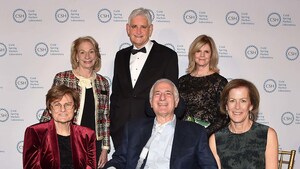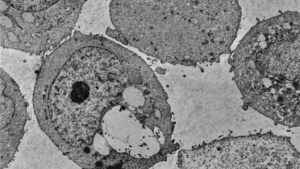Organoid profiling identifies treatments for pancreatic cancer
COLD SPRING HARBOR, N.Y., May 31, 2018 /PRNewswire/ -- Patient-derived organoids, hollow spheres of cells cultured from tumors, can quickly and accurately predict how patients with pancreatic cancer respond to a variety of treatments, facilitating a precision-medicine approach to the deadly disease.
That is the conclusion of an international team of researchers led by David Tuveson, Cold Spring Harbor Laboratory (CSHL) Professor and Chief Scientist for The Lustgarten Foundation.
"We've been able to identify an approach to prioritize treatment strategies for pancreas cancer patients, with the goal of giving them the best shot at survival and a good quality of life," says Dr. Hervé Tiriac, a researcher in Tuveson's lab.
With only 8 percent of patients surviving 5 years beyond their diagnosis, pancreatic cancer is one of the deadliest cancers. Currently, surgical removal of the cancerous tissue is the only effective treatment, but because the disease progresses so quickly, only 15 percent of patients are eligible for the procedure. Doctors can treat the symptoms of surgery-ineligible patients with drugs or chemotherapy. But patient response is highly varied, and there is no good method to determine which treatment is best for any given patient.
Obtaining high-quality samples of pancreatic cancer has been challenging. Tuveson's team has addressed this with organoid technology. They take as little as 6 weeks to grow and can be derived from patients with even very advanced pancreatic cancer, using tiny biopsies.
Today in Cancer Discovery, Tuveson's team reports on their findings from a library of 66 organoids derived from pancreatic tumor specimens at various stages. They demonstrated that the organoids provide an effective precision-medicine "pharmacotyping," or drug-testing, pipeline. To do this, "we culture the organoid from the patient's cancer and then test all possible standard-of-care drugs as well as experimental drugs," Tiriac explains.
The team assessed RNA levels in individual organoids to determine gene signatures predictive of sensitivity to the five chemotherapies administered to pancreatic cancer patients. Those showing sensitivity to specific drugs lived much longer before the cancer progressed. "Therefore, the signatures should enable physicians to choose the correct chemotherapy for pancreatic cancer patients for first-line treatment," Tuveson says. Since many of the organoids that did not respond well to chemotherapy were sensitive to various investigational drugs, patients who lacked the sensitivity signatures "might instead more quickly be treated with experimental agents," he adds.
The team will further refine the gene signatures in additional experiments, and hope to test in clinical trials the signatures' ability to prospectively predict the improved responses of pancreatic cancer patients.
Funding: Lustgarten Foundation; NIH, NCI, 18 others.
About Cold Spring Harbor Laboratory
Founded in 1890, Cold Spring Harbor Laboratory has shaped contemporary biomedical research and education with programs in cancer, neuroscience, plant biology and quantitative biology. Home to eight Nobel Prize winners, the private, not-for-profit Laboratory employs 1,100 people including 600 scientists, students and technicians. For more information, visit www.cshl.edu
SOURCE Cold Spring Harbor Laboratory
Related Links
WANT YOUR COMPANY'S NEWS FEATURED ON PRNEWSWIRE.COM?
Newsrooms &
Influencers
Digital Media
Outlets
Journalists
Opted In






Share this article